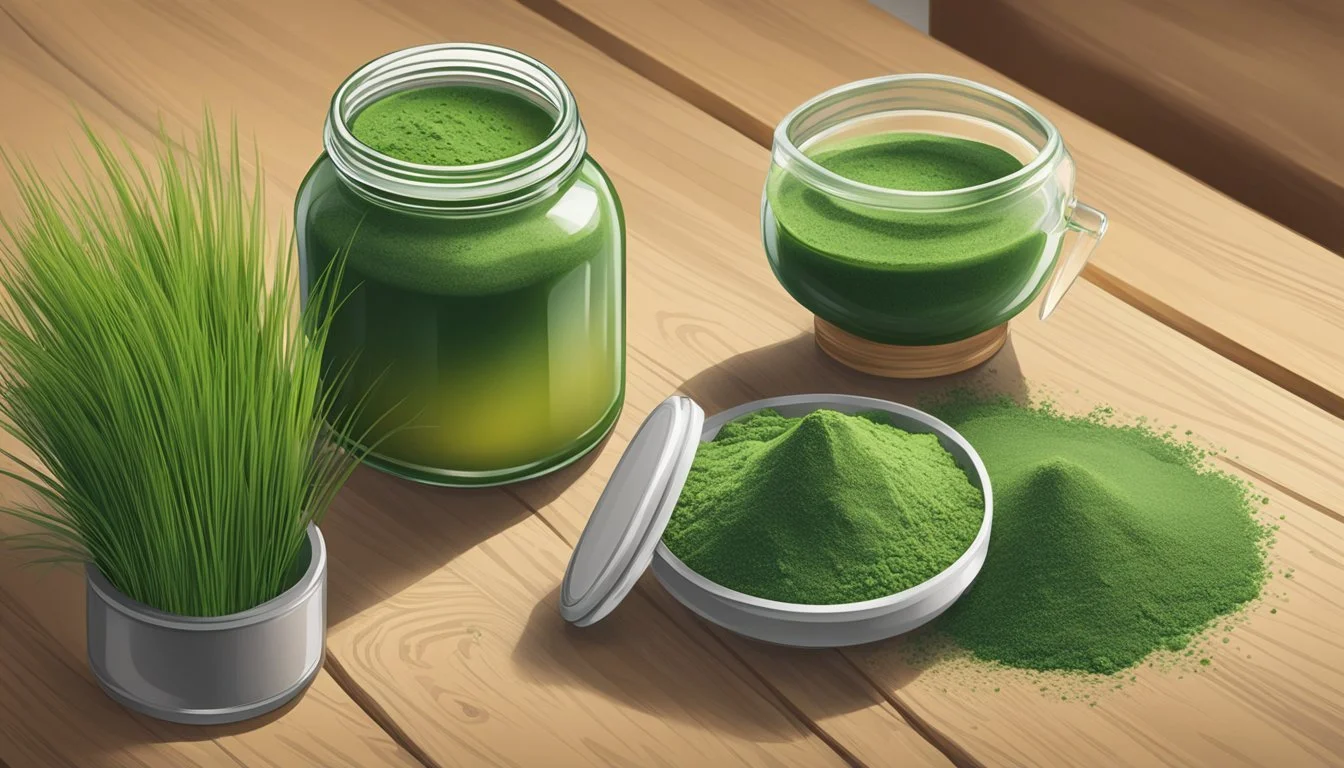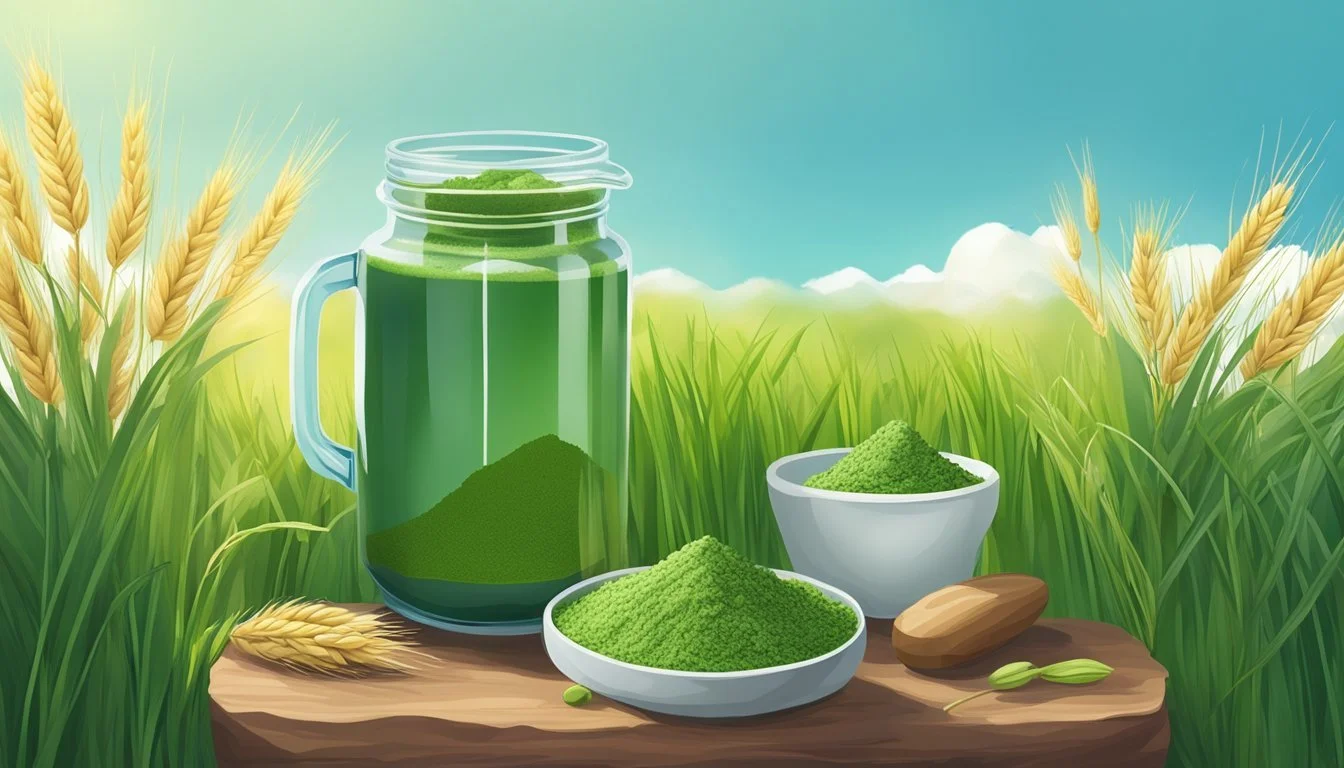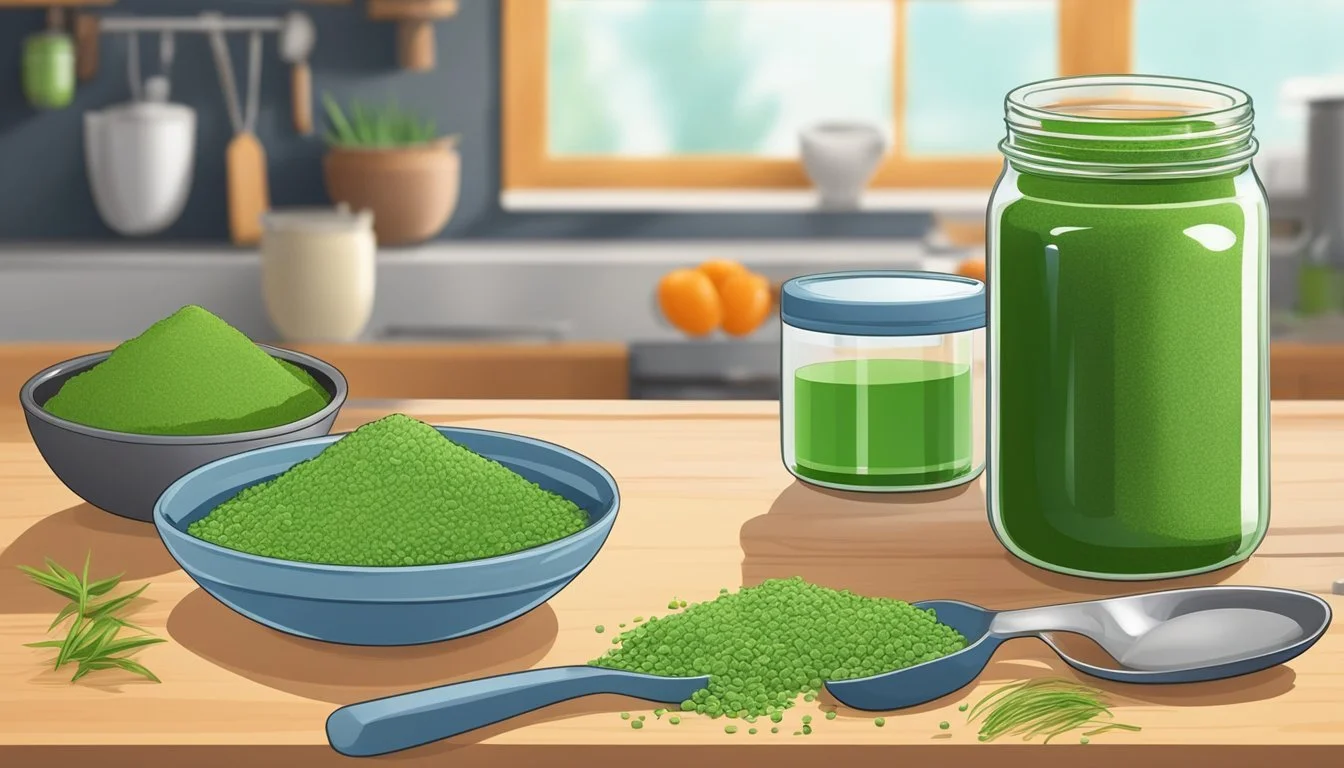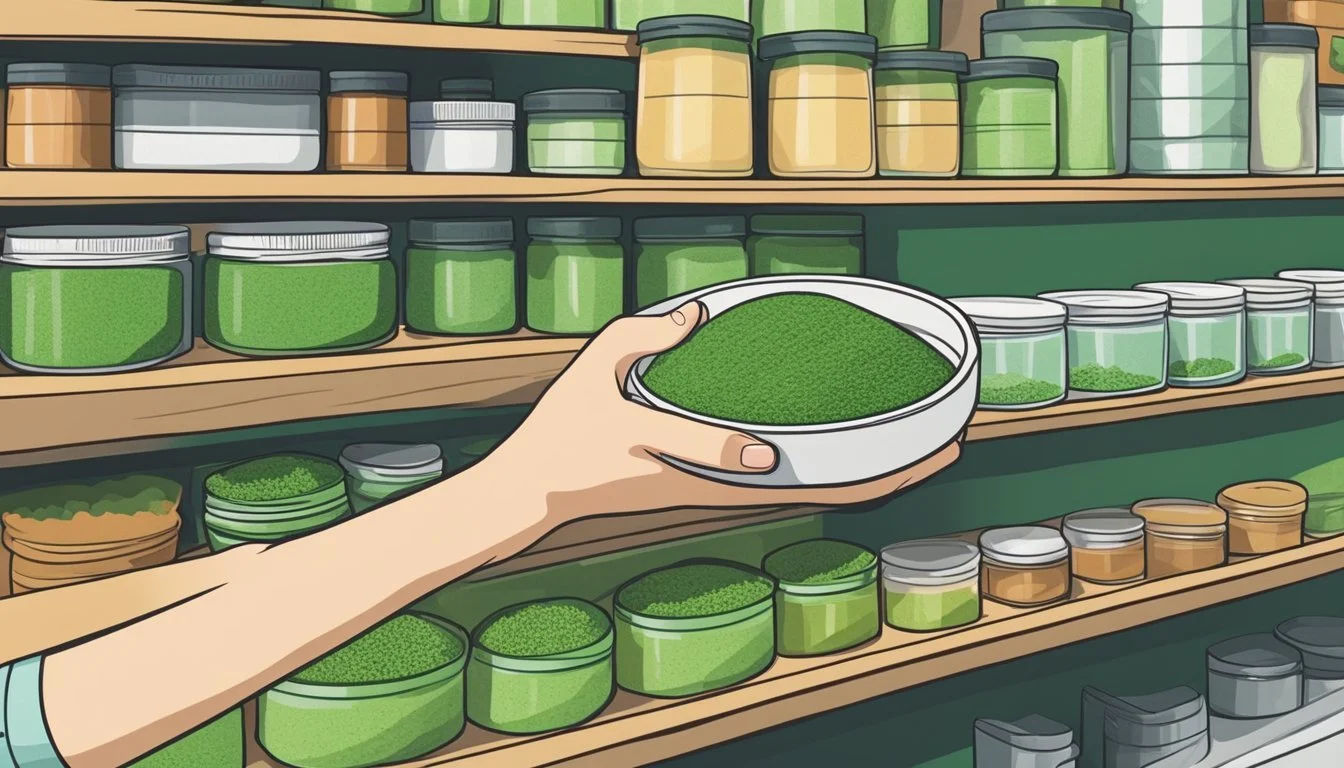Wheatgrass Powder Substitutes
Top Alternatives for Your Diet
For those seeking alternatives to wheatgrass powder, numerous substitutes offer a variety of health benefits and comparable nutrient profiles. Wheatgrass powder is known for being rich in vitamins A, B, C, and E, as well as minerals like potassium, calcium, and iron. These nutrients contribute to better digestion, increased energy levels, and overall well-being.
One popular alternative is barley grass powder, which boasts a similar nutrient composition with vitamins and minerals essential for health. Additionally, spirulina powder presents itself as another viable substitute. This blue-green algae is packed with protein, antioxidants, and essential amino acids, making it a powerful addition to any diet.
For those looking for a caffeine-free option, moringa powder serves as an excellent choice. Derived from the Moringa oleifera plant, it is abundant in vitamins, minerals, and antioxidants that support immune function and provide an energy boost. By exploring these substitutes, you can find the one that best suits your dietary preferences and nutritional needs.
Understanding Wheatgrass Powder
Wheatgrass powder is known for its dense nutrient profile and numerous health benefits. It is commonly used in various recipes to enhance the nutritional value of meals and beverages.
Nutritional Profile
Wheatgrass powder is rich in essential vitamins and minerals. It contains Vitamins A, C, E, and K, which support various bodily functions from vision to blood clotting. Additionally, it is a good source of Iron, Calcium, and Magnesium, vital for maintaining healthy bones, oxygen transport, and muscle function. The powder also boasts a high concentration of Chlorophyll, Amino Acids, and Enzymes, which contribute to its detoxifying properties and overall vitality enhancement.
Health Advantages
The health advantages of wheatgrass powder are numerous. It serves as a powerful Antioxidant, aiding in fighting free radicals and reducing oxidative stress on the body. The presence of Chlorophyll contributes to detoxifying the system, potentially improving liver function and overall detoxification processes. Vitamins and Minerals in wheatgrass powder support the Immune System, boosting the body's resistance to infections. Regular consumption might also help in lowering Cholesterol Levels and improving Digestion due to its high fiber content and enzymatic activity.
Common Uses in Cooking and Beverages
Wheatgrass powder is a versatile ingredient in the kitchen. It is commonly added to Smoothies and Juices to elevate their nutritional content. A spoonful of wheatgrass powder can be blended into a green smoothie or mixed with fruit juices to create a nutrient-packed drink. Moreover, wheatgrass powder can be included in various Recipes, such as energy bars or protein balls, offering an easy way to boost daily nutrient intake. In Cooking, it can be sprinkled over salads or incorporated into dressings, providing a subtle earthy flavor and numerous health benefits.
Why Seek Substitutes?
People look for substitutes for wheatgrass powder due to taste preferences, potential side effects, and dietary restrictions. Each factor plays a pivotal role in determining whether an alternative is needed.
Taste and Flavor Preferences
Wheatgrass powder is known for its grassy and often bitter flavor, which may not appeal to everyone.
Some individuals find the taste unpalatable, affecting their willingness to consume it regularly. Green tea powder, spirulina, and barley grass powder are popular substitutes that offer different flavors.
Trying a substitute can provide a more enjoyable experience and make it easier to maintain a healthy routine. Ensuring that the flavor aligns with personal preferences is crucial for long-term adherence to dietary habits.
Potential Side Effects
Although wheatgrass powder is generally considered safe, it can cause side effects in some people.
Symptoms such as nausea, headache, and allergic reactions have been reported. These side effects can deter people from its consumption. Alternative powders like spirulina and moringa may cause fewer adverse reactions.
Choosing a substitute can help avoid these unwanted effects while still gaining similar health benefits. People prone to digestive issues might also seek alternatives to alleviate gastrointestinal discomfort.
Dietary Restrictions
Wheatgrass powder is gluten-free, but those with celiac disease or gluten sensitivity must ensure any substitute is also safe.
Some individuals may have specific allergies to components in wheatgrass that necessitate a change. Common substitutes like green tea or barley grass powder should be checked for potential allergens.
Individuals adhering to specific diets, such as vegan or raw food diets, often find substitutes that align with their nutritional guidelines. Ensuring that the chosen alternative fits within dietary restrictions is essential for avoiding health complications.
Substitutes for Wheatgrass Powder
Several alternatives to wheatgrass powder provide a range of nutrients, antioxidants, and benefits. Each substitute offers distinct characteristics suitable for different dietary needs and preferences.
Barley Grass Powder
Barley grass powder is often used as a substitute for wheatgrass powder. It is rich in vitamins A and C, which help boost the immune system. Barley grass is known for its high levels of antioxidants and chlorophyll, making it a potent detoxifying agent. The texture of barley grass powder is smooth, making it easy to mix into smoothies or juices. It also contains nine essential amino acids, ensuring it provides complete protein.
Spirulina Powder
Spirulina powder is a well-known superfood, packed with protein, B vitamins, and iron. It stands out due to its high protein content, which makes up about 60-70% of its dry weight. Spirulina is a great source of antioxidants and has notable anti-inflammatory properties. It is particularly beneficial for those looking to enhance muscle recovery and boost energy levels. Its slightly earthy taste is well-suited for blending into various beverages.
Chlorella
Chlorella is another algae-based superfood that serves as an excellent replacement for wheatgrass powder. High in fiber and chlorophyll, chlorella aids in detoxifying the body by binding to heavy metals and toxins. It contains a wealth of vitamins and minerals, including B vitamins and iron. The detoxifying effect and its ability to improve gut health make chlorella a valuable addition to anyone’s diet. Its flavor is more intense compared to wheatgrass.
Moringa Powder
Moringa powder is derived from the moringa tree leaves and is celebrated for its rich nutrient profile. It is abundant in calcium, vitamins A and C, and iron. Moringa has potent anti-inflammatory and antioxidant properties, making it a versatile substitute for wheatgrass powder. Its slightly spicy and earthy flavor works well in smoothies, soups, and teas. Moringa also contains all nine essential amino acids, providing a complete protein source.
Matcha Powder
Matcha powder, made from finely ground green tea leaves, is known for its high levels of antioxidants, particularly catechins. It contains natural caffeine, providing a gentle energy boost without the jitters often associated with coffee. Matcha has a distinctive, slightly savory flavor that can be balanced with sweeteners or blended into lattes and baked goods. Its rich nutrient profile includes vitamins, minerals, and chlorophyll.
Each of these substitutes offers unique benefits, making them excellent alternatives to wheatgrass powder depending on specific health goals and taste preferences.
Culinary Applications for Substitutes
When substituting wheatgrass powder, ingredients like green tea powder, barley grass powder, and spirulina can be used effectively. Each substitute brings unique flavors and health benefits to various dishes.
Smoothies and Beverages
Green tea powder, like matcha, is excellent for smoothies. It adds a mild, earthy taste and provides antioxidants. Using a 1:1 ratio with wheatgrass powder ensures a balanced flavor.
Barley grass powder is another effective substitute. It has a similar nutrient profile and a mild flavor, making it great for green smoothies and lattes. Ensure to blend it well to avoid clumping.
Yerba mate can also be used. It's a good source of caffeine and has a stronger, slightly bitter taste.
Using these substitutes in beverages enhances their nutritional value without compromising taste.
Baked Goods and Cooking
In baking, barley grass powder works well to replace wheatgrass powder. Its vitamins and minerals enrich baked goods like breads and muffins without altering the taste significantly.
Green tea powder can also be used in cookies, cakes, and breads, giving a subtle tea flavor. It pairs well with sweeteners like honey or sugar.
Spirulina, while less common, can be incorporated into savory dishes. It adds a distinct flavor that complements soups and stews.
Replacing wheatgrass powder in recipes with these alternatives allows for versatile and nutrient-dense culinary creations.
Special Considerations
When considering substitutes for wheatgrass powder, it is important to address practical concerns such as correct dosage and preparation, as well as possible interactions and contraindications with other health conditions or medications.
Dosage and Preparation
Proper dosage is crucial for effectiveness. Typically, 1-2 teaspoons of greens powder daily is recommended.
Start with a smaller amount to gauge tolerance. Most substitutes can be mixed with water, juice, or smoothies. For supplements replacing fresh juice, the dosage might differ; read labels carefully.
Preparation methods vary. Some substitutes require blending for better absorption. Check if the substitute should be taken on an empty stomach or with food for optimal results.
Interactions and Contraindications
Interactions with medications are critical to consider. Certain substitutes may affect the efficacy of drugs used in treating chronic diseases like diabetes or hypertension.
Individuals undergoing chemotherapy should consult healthcare providers before using any greens powders, as some may interfere with treatment.
Those with anemia should ensure substitutes provide iron. People with arthritis should verify anti-inflammatory benefits.
Monitor any changes in digestion, and discontinue use if adverse effects occur. Consulting a healthcare provider is recommended to ensure safe and effective use of any wheatgrass powder substitute.
Purchasing and Storage
When looking to buy wheatgrass powder, health food stores are a reliable option. These stores often carry high-quality, organic products. It's also possible to find wheatgrass powder online. Ensure the product is certified organic and free from additives.
For optimal shelf life, wheatgrass powder should be sealed in an airtight container. Stored this way, it can last two to three years. Keep the container in a cool, dark place, avoiding exposure to heat and moisture.
Proper storage is critical to maintaining the nutrient integrity of the powdered form. Store any opened packages in a refrigerator if the product's packaging allows. If not, ensure they are placed in airtight containers to prevent spoilage.
Quick Storage Tips
Use airtight containers: Prevent contamination and moisture exposure.
Refrigerate after opening: If the package permits, refrigeration extends freshness.
Label and date: Always mark the storage date to monitor freshness.
Purchasing from trusted sources ensures the quality and effectiveness of wheatgrass powder, providing maximum health benefits.
Navigating Through Substitutes
Finding the right wheatgrass powder substitute involves considering health benefits, nutrient profiles, and how they fit into your diet. It's crucial to choose substitutes that provide similar nutrients and benefits while keeping your taste preferences in mind.
How to Choose the Right Substitute
When selecting a substitute for wheatgrass powder, it's essential to focus on the nutrient profile. Barley grass powder is a popular choice due to its similar antioxidant properties and high nutrient content.
Another viable option is spirulina powder, known for its high protein content and abundance of vitamins and minerals, which can provide an energy boost. Moringa powder is another good substitute, rich in vitamins A, C, and iron, making it beneficial for boosting immunity and overall health.
Taste also plays a crucial role. Some may find barley grass powder’s flavor milder than wheatgrass, while spirulina may have a more distinct taste.
Nutrient Profile Comparison:
Substitute Key Nutrients Barley Grass Antioxidants, Vitamins A and C, Iron Spirulina Protein, B vitamins, Iron Moringa Powder Vitamins A, C, Calcium, Potassium
Incorporating Substitutes into Your Diet
Adding substitutes to your diet is straightforward. If you're used to taking wheatgrass in smoothies, try replacing it with barley grass powder in a 1:1 ratio. This ensures a smooth transition without significant changes to the taste or texture.
For those incorporating spirulina, start with small amounts due to its potent flavor. Blend it into smoothies or mix it with juices to mask the taste while still reaping the benefits. Moringa powder can be used similarly, with its slightly earthy taste blending well in various recipes like soups and sauces.
Remember, the key is to experiment and adjust based on your taste buds and health goals. Always ensure that the substitute fits your dietary needs and complements your overall nutrition plan.







